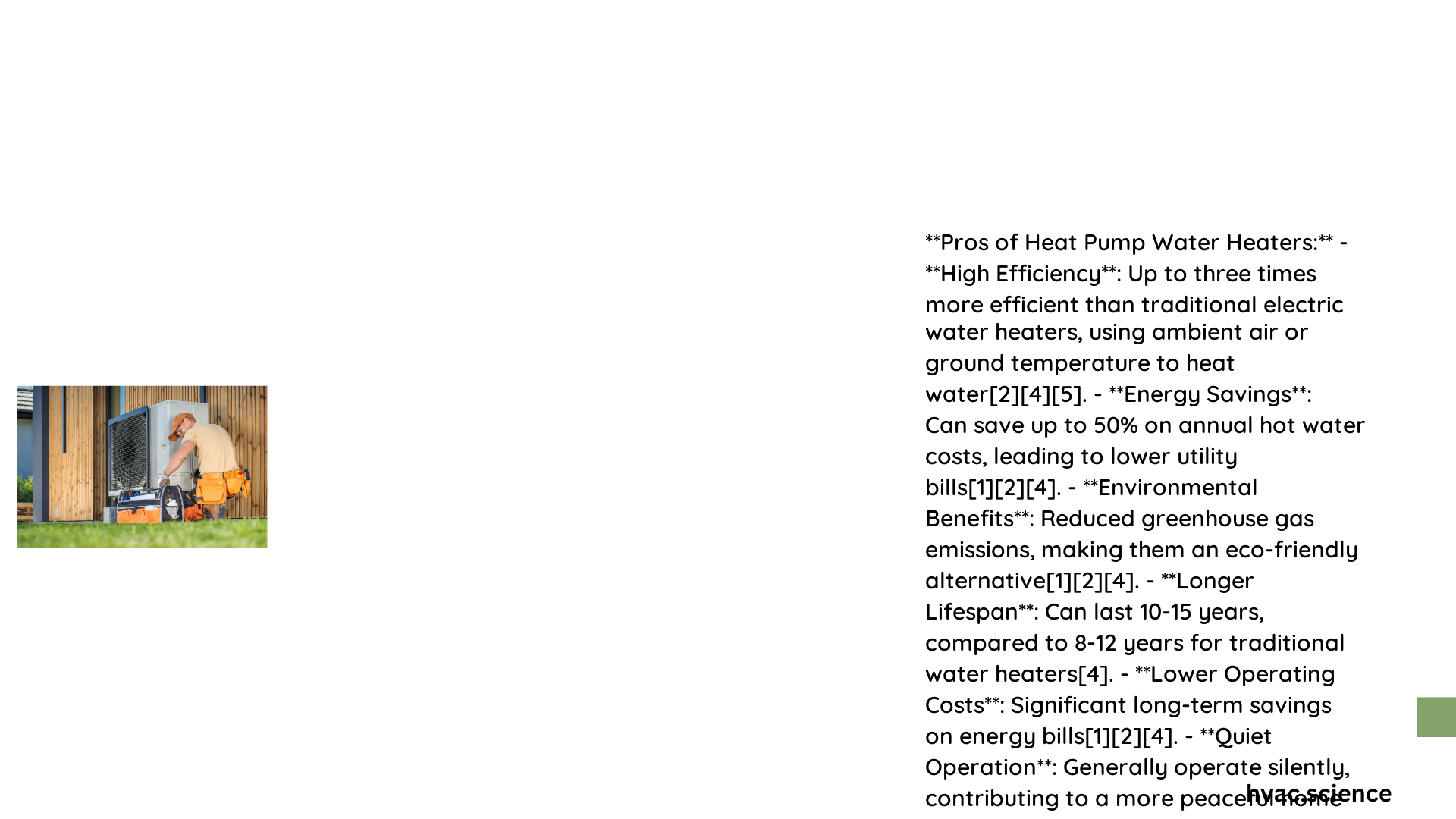Heat pump water heaters represent a revolutionary approach to home water heating, offering substantial energy savings and environmental benefits. These innovative systems leverage advanced technology to extract heat from surrounding air, providing an efficient alternative to traditional water heating methods. Homeowners can expect significant long-term cost reductions, improved energy performance, and reduced carbon footprint by understanding the comprehensive pros and cons of this cutting-edge technology.
What Makes Heat Pump Water Heaters Unique?
Heat pump water heaters differ fundamentally from conventional water heating systems by transferring heat instead of generating it directly. This innovative approach allows for remarkable energy efficiency and substantial operational cost savings.
How Do Energy Savings Work?
| Metric | Traditional Electric Heater | Heat Pump Water Heater |
|---|---|---|
| Annual Energy Consumption | 4,000-5,000 kWh | 1,500-2,000 kWh |
| Energy Factor (EF) | 0.9-1.0 | 2.0-3.5 |
| Estimated Cost Savings | Base Rate | Up to 50% |
What Are the Primary Advantages?

Can Heat Pump Water Heaters Reduce Energy Costs?
Heat pump water heaters deliver exceptional energy efficiency through several key mechanisms:
- Advanced Heat Transfer Technology: Extracts ambient heat from surrounding air
- Lower Electricity Consumption: Reduces energy usage by up to 60%
- Potential Utility Rebates: Many regions offer incentives for energy-efficient appliances
Do They Provide Environmental Benefits?
Environmental advantages include:
- Reduced greenhouse gas emissions
- Lower carbon footprint
- Alignment with sustainable energy goals
- Minimal reliance on fossil fuel-generated electricity
What Challenges Might Homeowners Face?
Are Installation Requirements Complex?
Critical installation considerations include:
- Minimum 1,000 cubic feet of surrounding air space
- Ambient temperature range of 40°F-90°F
- 240-volt electrical connection
- Potential professional installation costs
What Performance Limitations Exist?
Potential performance challenges:
- Slower water heating compared to traditional systems
- Reduced efficiency in extremely cold environments
- Higher initial equipment investment
- Potential noise during operation
How Do Operational Costs Compare?
What Financial Implications Should You Consider?
Financial breakdown:
– Initial Cost: $1,000-$3,000
– Annual Operating Cost: 50% less than traditional heaters
– Estimated Lifespan: 10-15 years
– Potential Energy Savings: $300-$600 annually
What Maintenance Requirements Exist?
How Can You Optimize System Performance?
Recommended maintenance practices:
– Regular air filter cleaning
– Annual professional inspection
– Monitor refrigerant levels
– Check electrical connections
– Ensure proper ventilation
Who Should Consider Heat Pump Water Heaters?
Ideal candidates include:
– Environmentally conscious homeowners
– Those with moderate to warm climate conditions
– Individuals planning long-term residence
– Energy efficiency enthusiasts
Final Recommendations
Carefully evaluate your specific household requirements, local climate, and budget before investing. While heat pump water heaters offer remarkable benefits, individual circumstances determine their optimal implementation.
Technical Specifications to Verify
- Energy Factor (EF) rating
- Uniform Energy Factor (UEF)
- Installation space requirements
- Electrical compatibility
- Local utility incentives
Reference:
– Energy.gov Heat Pump Water Heaters
– ENERGY STAR Guidelines
– Department of Energy Efficiency Resources
